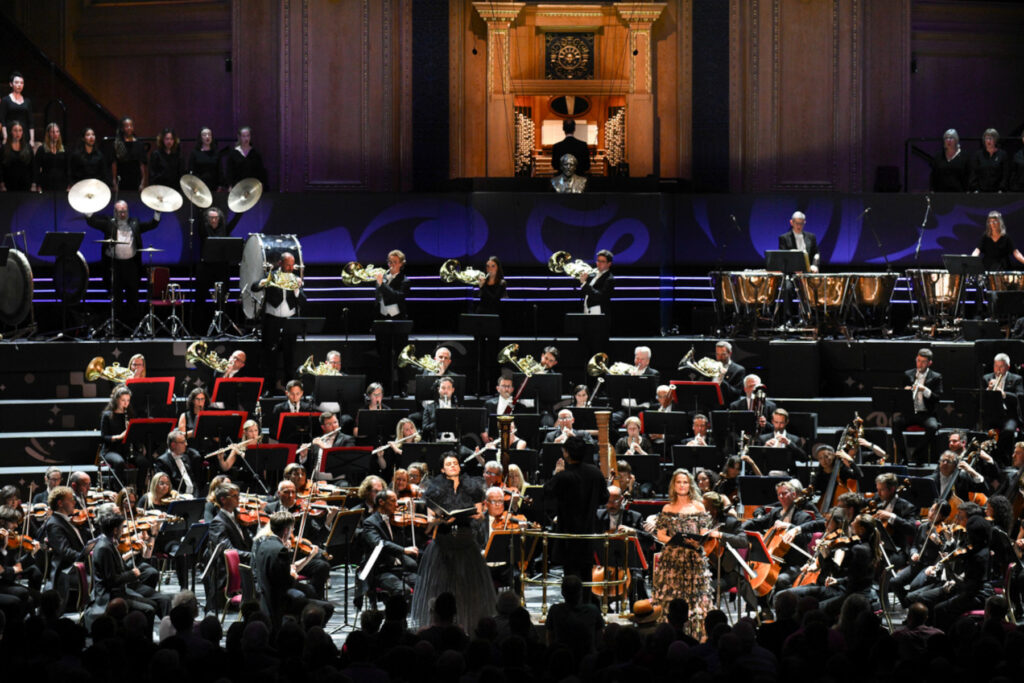The Singaporean-born conductor Kahchun Wong is certainly a fascinating one based on this performance of Mahler’s Resurrection Symphony. A winner of the Gustav Mahler Conducting Competition (2016), where he conducted the composer’s Third Symphony, there was much to enjoy – and much to find fault with – in his conducting of the Second: this seemed to me a work in progress, or perhaps just incomplete from rehearsals. One sensed, for example, some quite lavish (even dazzlingly brilliant) detail in the vast opening funeral march that was simply missing throughout the rest of the symphony. Spacious tempo he set for the first movement (reminiscent of late Klemperer) seemed to fall in and out of place (notably for some epic off-stage horns), and climaxes were not quite as dramatic, or impactful, as Wong’s long beat suggested they might be. If the symphony proved more fast-moving, more fluid, than anything his trenchant opening to the work implied, I’m not sure the benefit was to make the performance a remarkable one: it’s hard in this symphony to be underwhelmed by its closing bars, but Wong came close to it.
There is an undeniable elegance to his conducting. He clearly knows the score (although doesn’t use one) but too often this felt like a micromanaged performance – or one that wasn’t placed under the microscope at all, but rather the opposite. I did rather enjoy the Barbirolli-like accents on the cellos during the opening of the funeral march, even if they felt exaggerated; arguably, those dotted martial rhythms erred just slightly on the side of the overplayed – but they sounded fresh. The spaciousness he gave to the first violins was equally challenging – even if they still lacked a certain warmth of tone. More convincing was his handling of the woodwind – the flick of the left hand getting the most charismatic playing from a flute or a clarinet. It all felt just a little monumental, unrelenting – the majestic drama of it was undeniably there, even if the conclusion to the movement (without the “schnell” ending) lacked a certain flammability.

The Andante was beautifully done – relaxed, luscious, with an almost portamenti feel to the strings, and gorgeous glissandi – and this led to a relaxed (perhaps too relaxed) view of the Scherzo. Inner details didn’t quite emerge with the focus Wong brought to the first movement (one might have wished for more dynamic playing from the percussion, for example). The real problem for me was an underwhelming reading of the Urlicht movement, with the mezzo-soprano, Emily D’Angelo, neither of sufficient depth nor dramatic weight to sing the part (although detached she wasn’t). Wong, hardly lugubrious here, just seemed disinterested, giving one of the fleetest, but most earthbound readings of Urlicht I can recall. One wondered whether rather than singing from the front of the stage, too, both soloists would have been better placed in front of the choruses – neither was remotely audible during the choral conclusion singing in unison with them from where they were standing.
The final movement was, by and large, a success – although, again, the Hallé’s playing after Wong’s long beat didn’t always sound as cavernous as it might have (such as in the Dies Irae chorale). There was a beautiful sense of proportion to the movement; a heroic march, although perhaps the overwhelming outburst (at measure 26) lacked sufficient punch in the percussion. What was not in doubt here were the superlative brass of the Hallé (especially the horns). Off-stage bands were a little more controversial, perhaps – the acoustic of the Royal Albert Hall, and the placing of the band high up in the gallery, made them resonate with a considerable presence. The Grand Appell section was gripping, however – the hushed chorale opening magically from the Hallé Choir and the Hallé Youth Choir. Beautiful, too, was the understated entry of the soprano – Mari Eriksmoen. As with D’Angelo, the voice wasn’t large – but it wasn’t distractingly grating either. The Auferstehn climax was thrilling; how unfortunate, however, that Wong chose to overplay his hand in the closing bars by an overbearing beat that his orchestra couldn’t keep up with. It felt just a little underwhelming.
Marc Bridle
Mahler’s ‘Resurrection’ Symphony (BBC Proms 2025)
Gustav Mahler – Symphony Nr.2, “Resurrection”
Mari Eriksmoen – soprano; Emily D’Angelo – mezzo-soprano; Hallé Choir; Hallé Youth Choir; Hallé; Kahchun Wong – conductor
Royal Albert Hall, London, 2 August 2025
All photos © Chris Christodoulou